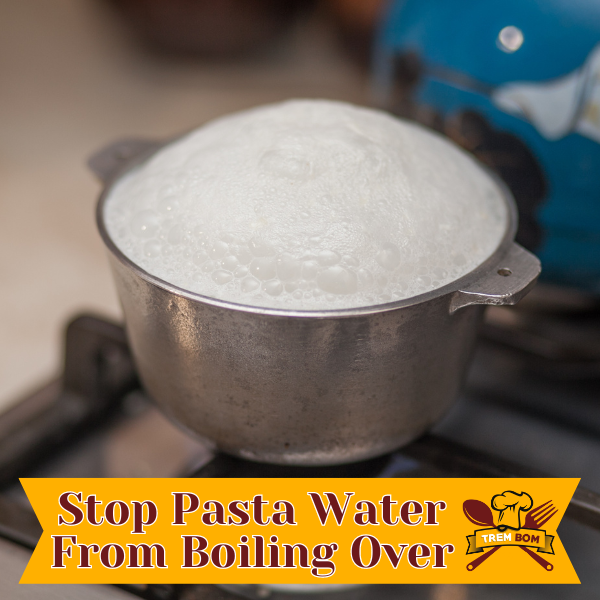
Understanding the Boiling Process of Pasta Water
The Science Behind Boiling: How Pasta Water Reacts in a Pot
Did you know that when you boil pasta, the starchy water can create a mess in your kitchen? It’s all about the boiling water reacting with the starch from the noodles. Understanding this reaction is crucial to prevent your pot from becoming a volcanic eruption on your stove.
Factors Influencing Water Boil Over in Pasta Cooking
Temperature, pot size, and the amount of water can significantly impact whether your pasta water spills over. For instance, using less water in a larger pot can reduce the chances of a spill.
Preventative Measures for Keeping Your Pot From Boiling Over
Choosing the Right Pot for Cooking Pasta
The big pot is your best friend here. A stock pot is ideal, allowing enough room for the water to boil without creating a mess. It’s a simple tip, but it makes a world of difference.
Ideal Water-to-Pasta Ratios: Key to Prevent Boiling Over
Less is more when it comes to water. By using less water, you give the pasta enough space to cook without the water boiling over the top of the pot.
Practical Tips to Stop Water From Boiling Over
Kitchen Tips: Adjusting Heat Settings for Optimal Cooking
Lower the flame or burner temperature once the water reaches a rolling boil. This method is a genius hack to prevent your pot from boiling over while ensuring your pasta is perfectly cooked.
Stirring Techniques: A Simple Yet Effective Method to Prevent Overboiling
Regularly stir your pasta. This prevents it from sticking together and helps to distribute heat evenly, preventing the boil from getting too rigorous.
Advanced Strategies to Control Pasta Water Boiling
The Role of Ingredients: Mythology of Adding Oil or Salt
It has been said that adding a little olive oil or butter can change the surface tension of the water, helping to prevent it from boiling over. However, this is not a universally accepted method for stopping boilover issues, and after much testing I can say that it is not one I stand behind at all.
Plus you get slippery noodles.
And no one likes slippery noodles.
Innovative Kitchen Tools to Help Manage Boiling Water
Ever heard of a spill stopper? This silicone lid sits across the top of your pot, letting steam escape while keeping the boiling water contained. It’s a tip straight from the favorite kitchen hacks newsletter.
The Art of Perfect Pasta: Balancing Boil and Taste
Timing and Attention: Key Factors in Perfect Pasta Preparation
Keep an eye on your pot! The best way to prevent a disaster is to monitor the pot of water as it nears boiling. This way, you can adjust the heat as needed.
Final Touches: How to Serve Pasta Without the Boil Over Woes
Once your pasta is cooked, adding a bit of butter or olive oil can not only enhance flavor but also help in reducing the starchy residue, which often causes boil-overs.
Mastering the Craft of Pasta Water Management
Summary of Essential Tips to Prevent Your Pasta Water from Boiling Over
Remember, the key to perfect pasta is balancing the boil, the pot, and your attention. Use a larger pot, keep the water level in check, and don’t forget to stir occasionally.
Embracing Patience and Precision for the Perfect Pasta Experience
Patience is the secret ingredient in any pasta recipe. By controlling the temperature, using the right tools, and employing these tips and tricks, you can say goodbye to messy kitchen disasters. Happy cooking!
Pasta Water Boiling Over FAQ
Q: Why does pasta bubble over when boiling?
A: Pasta bubbles over due to the starch released into the water, which increases its viscosity and creates foam. When this foam rises with the steam, it can cause the water to overflow.
Q: Does oil help pasta not boil over?
A: Adding oil to pasta water is a common practice, but it has minimal effect on preventing boil-over. It can slightly reduce surface tension, which may help a bit, but it’s not a foolproof solution.
Q: Does butter stop water from boiling over?
A: Like oil, butter can slightly reduce the surface tension of boiling water, which might help prevent boil-overs. However, its effect is limited and not always reliable.
Q: How do you stop boiling water from overflowing?
A: To prevent boiling water from overflowing, use a larger pot, reduce the heat after reaching a boil, stir the water occasionally, and consider using a spill stopper or placing a wooden spoon across the top of the pot.
Q: Why can’t you put pasta in water before it boils?
A: Adding pasta to water before it boils can lead to uneven cooking and a sticky texture. Boiling water ensures a consistent temperature, which is essential for evenly cooked pasta.
Q: Does Gordon Ramsay put oil in pasta water?
A: Gordon Ramsay, like many chefs, has not specifically advocated for adding oil to pasta water as a standard practice. The technique varies among chefs and is subject to personal preference.
Q: Why you shouldn’t put oil in pasta water?
A: Adding oil to pasta water can prevent sauce from adhering well to the pasta, as the oil creates a slippery surface. It can also be a waste of oil, as most of it stays in the water rather than on the pasta.
Q: Why add salt to boiling water for pasta?
A: Salt is added to boiling water for pasta to enhance its flavor. The salt seasons the pasta from the inside as it cooks, giving it a better taste.
Q: Why do chefs save pasta water?
A: Chefs save pasta water because it’s rich in starch, which can be used to thicken sauces and help them adhere better to the pasta. It’s a useful trick for creating a more cohesive and flavorful dish.






